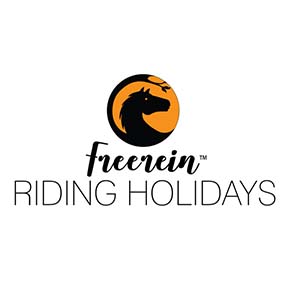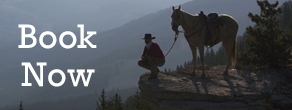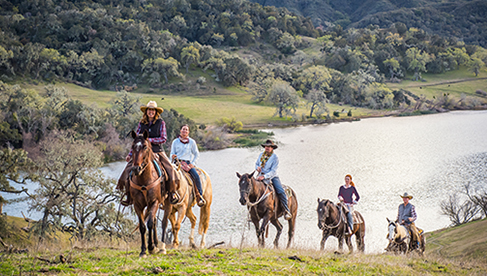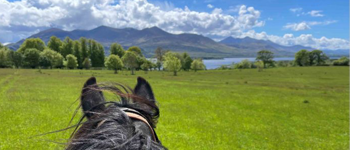Dream Jobs: Grooming for an Olympic Rider
Liv Gude, former groom for Guenter Seidel, shares how you can groom your way to an equine career.
by Karen Braschayko
Have you ever wanted to meet champion riders and care for some of the finest horses in the world? Liv Gude did just that when she groomed for an Olympic dressage rider. Here she explains what it’s like to work as a groom and how she is helping build the profession through Professional Equine Grooms, a website community she created. Read how grooming can lead to a dream job with horses.
Karen Braschayko for Equitrekking: Tell us about your background with horses. How did it lead to working as a groom for an Olympic rider?
Liv Gude: My background starts many moons ago as a six-year-old going to summer camps and learning on hunters and jumpers until mid high school. Living in Virginia, it was a classical hunter scene. Then, transplanted to Texas, while I was in college and for a few years after, I started riding Western. I rode cutters and reiners and just had fun on those great cow ponies. After marriage and a move to California, I picked up the hunters again and bought myself a young project horse. I trained him for hunting, penning, trail, jumping and lower-level dressage. I've even schooled him in cross country, and we’ve herded goats and ponied our fair share of naughty horses.
I was getting burned out working in the corporate scene, and I really wanted my master’s degree. To escape from the books, papers and thesis for a few hours a week, I started teaching beginner Western and English lessons. On my way home one day, I stopped at the local tack shop and saw an ad seeking a part-time groom for Olympic dressage rider Guenter Seidel. Done! That got my foot in the door.

Liv Gude shares a moment with her horse Miguel. Photo by Chris Rozsypal.
Equitrekking: What are the biggest perks of the job?
Liv Gude: The perks are pretty much the reason we do what we do. Let’s be real here. If there were no perks, why would we work these hours? For some of us, a perk is just rubbing the nose of a beloved horse in the barn. For others, it’s rubbing elbows at a big show with famous riders.
You may get swag, which can range from hats to saddle pads, miscellaneous tack and even prizes from shows. I was in charge of picking up ribbons and prizes for a male rider for whom I worked. I would always pick the pink prizes so that I could keep them!
You may also get the chance to see some amazing riding or be able to listen in on lessons that they are giving their students. These are gems of wisdom. You may also get lessons as a perk. I never turned one of these down, no matter how lousy, tired, sore, hot or cold I was. This is a gift of their time and knowledge to help you grow. Dozens of others would step on you for this chance. Just try to stay on during your lesson.
Equitrekking: Do you have any interesting stories about being a groom?
Liv Gude: I would say getting to ride Olympic and World Equestrian Games horses was amazing. One has won a silver medal. I took lessons from Olympians! I met talented trainers, grooms, vets and farriers, and I learned from each of them.
Being at a big show like a World Cup Qualifier or an Olympic Trial is like the who's who of the horse world. Even some of the shows that are not specific qualifiers but are governed by the Fédération Equestre Internationale (FEI) will have quite the rider, owner and horse turnout. It's not uncommon to see actors, musicians and famous business people at these shows. They are usually owners, or they have a spouse or child participating.
There is the added celebrity of the horses, and to see a horse in person that you have only seen on the internet is amazing. For most grooms, we care more about the celebrity horses than the people! At a World Cup Qualifier in Los Angeles several years ago, I was fortunate enough to see most of the Athens Olympics horses. Also attending were some great East Coast riders and horses. I saw two horses at that show that later went on to represent the USA in Hong Kong in 2008. Of course, at these shows it's great fun to see your horse enter the ring, perform and then exit, knowing you have just made a team that will represent the USA in international competition.
Equitrekking: What duties are common for a groom? What might a workday involve?
Liv Gude: A professional equine groom is defined as an individual working in a support position focusing on the day-to-day care of horses. I have always thought that being called a groom was strange, when the reality is that grooming takes such a small amount of time compared to the rest of the day.
Here is a groom’s typical day:
Get to the barn before all other living creatures and the sun are awake. Feed hay, grain and supplements. This is my favorite part of the day, when the earth is quiet and you only hear the munching of hay.
Next, it’s stall cleaning time. Also included in the morning chores is cleaning water buckets, which is a great time to make sure that the horses are all drinking well.
By this time, some horses will be ready to go for a ride or turnout, so you groom them, tack them up and take temperatures. After the rides and turnouts, horses and tack need to be cleaned.
In between all of these scheduled duties, there is plenty of extra work to do, like laundry, cleaning fences, minor repairs around the farm, arena maintenance and sometimes even riding. The day ends much like it started, with the horses quietly munching their hay.
Equitrekking: What kind of working and traveling conditions can a groom expect?
Liv Gude: Weather is a challenge. You are typically outside most of the day. The work is physical. You are on your feet often from before sunrise to after sunset. You walk miles and miles each day. You get into amazing shape. For travel, it varies from a show 30 minutes away, to an eight-hour trailer ride a few states over, to 48 hours on trailers, airplanes and then trailers again. When you travel with horses, you are usually with them every minute. It's quite exciting.
Working on a show circuit, especially one at the international or national levels, is a wonderful journey itself. Prepare for lots of travel to qualifying shows, and usually international riders will travel to Europe to train and compete for months on end. In these cases, grooms will be working nonstop, typically for weeks without a day off.
Even at the national level, travel to and from shows is exhausting. There is a lot of packing and unpacking. In an Olympic year, qualifying shows in the U.S. are far apart, from California to Florida and very few in between. Then there is the gap between the qualifiers and the championships, so perhaps you compete in Florida for the winter, go home to Arizona, then travel to New Jersey for the championships.
After you make the team, you may not have time to go home before you must meet for group practice. Then it's off to Europe usually for more training and maybe a show, then off to the Olympics. Then more training, then you move to the Olympic venue, compete, and do it all in reverse. The time on the road for some horses and grooms between championships and the Olympics can be months.
Equitrekking: How can an aspiring groom build a career?
Liv Gude: You build a career the same way a business person does, with integrity, grit, reputation, smarts, professionalism, knowledge, skills and determination. It’s always amazing to find out from other grooms how they got their start in the horse world. Everyone has a different story!
One of the first places you can start is at your own barn. Does your trainer need help? Can you volunteer a few hours to shadow one of the grooms and learn some techniques? Don’t be afraid to ask around. The horse world is small, and my experience has been that trainers ask each other for referrals when filling a grooming position. Talk to your horse friends.
Another place to start is by volunteering at a therapeutic riding center. These organizations need volunteers to run their programs. You will likely have responsibilities that include grooming and horse care, and you will learn while meeting other horse people and professionals.
Have you thought about asking your veterinarian or farrier? Those folks travel all over the area to different barns. Chances are, they know when someone is hiring a groom. Check in with your local feed and tack shops, also. Do they have a bulletin board? You could find an ad there, or make your own.
If you have a local show circuit, you could also set up your own small business. Many shows are just on weekends, but some are weeks on end. Is there a need for a stall cleaning service? What about braiding or tack cleaning? I often see enterprising young girls and guys raising pocket money by cleaning bridles and saddles at the shows. Doing this type of job well and professionally can grow into your dream grooming job.

Liv Gude leading her horse Miguel. Photo by Chris Rozsypal.
Equitrekking: How can working as a groom lead to a career in the horse world? How can someone make the most of this job?
Liv Gude: This job, like any job, is what you make of it. If you want to be a trainer, you align yourself with folks that can help you get there. Find mentors, not just employers. Be ready to bleed, sweat and cry.
I always use my days in the barn as a groom to gain knowledge. You will have the opportunity to talk with veterinarians, farriers, trainers, clients, saddle fitters, massage therapists and other grooms. Develop those relationships and learn from them. If you are the designated holder for a wiggly horse, use that time to ask questions if you can.
Get smarter. Find what you like and follow that path. I have known grooms who have become trainers, farriers, vet assistants, nutritionists and small business owners. Don't expect anyone in the horse industry to hand it to you.
On my first grooming job, I worked with a groom who went to the World Equestrian Games in Aachen, Germany, and many other international competitions here in the U.S. and overseas. He was always fascinated with shoeing, and really liked to work with the farriers and vets. After many years on the road and a new wife at home, he decided to follow his passion and apprentice with a farrier he had gotten to know quite well. To this day, he still works with the horses he groomed. He has also picked up a few of his own clients and continues to have a thriving trimming business as well.
Another dear friend of mine groomed for another Olympian and traveled all over Europe. When the time came for her employer to part ways with their sponsor, the sponsor asked my friend to stay on and ride. She is now riding four of their wonderful horses in international competitions.
Equitrekking: What are the hardest challenges a groom will face?
Liv Gude: As an industry, it's the hours, conditions and manual labor for very little money. Often there are no benefits or insurance, either, so every day is a risk. For me, it was always trying to find the energy and time to have a life and run a household with only one day off, with the other six days being 10 hours each. It's quite hard to keep up that pace!
Equitrekking: Tell us about Professional Equine Grooms and what you aim to accomplish.
Liv Gude: The main mission is to allow grooms to have a voice in the industry. I want to give grooms recognition for the work they do, educate grooms and employers alike on the legal issues about hiring grooms, award grooms with some fancy prizes, and give grooms and employers reasonable insurance options. This community will encompass professional equine grooms across all of the equine disciplines.
I seek to create a community for professional equine grooms which supports their short and long term career needs, providing resources for employment, continuing education and benefits. I will continue my mission to make our profession into a highly respected one.
While our primary purpose is to support the professional development of an equine groom, we welcome trainers, owners and riders into our community. We can all learn from each other, and we are all here for the same reason, the horse.
Contact Liv Gude and find extensive grooming resources at www.proequinegrooms.com.
Karen Braschayko is a freelance writer and horse lover who lives in Michigan.




